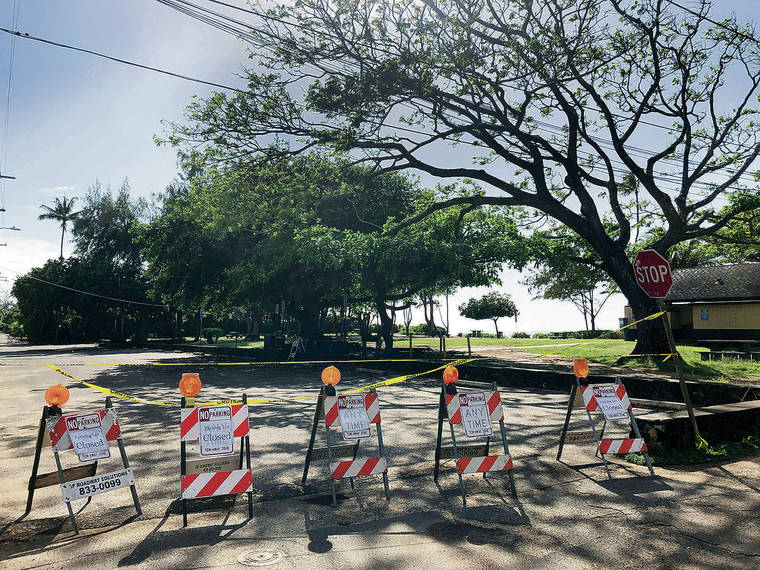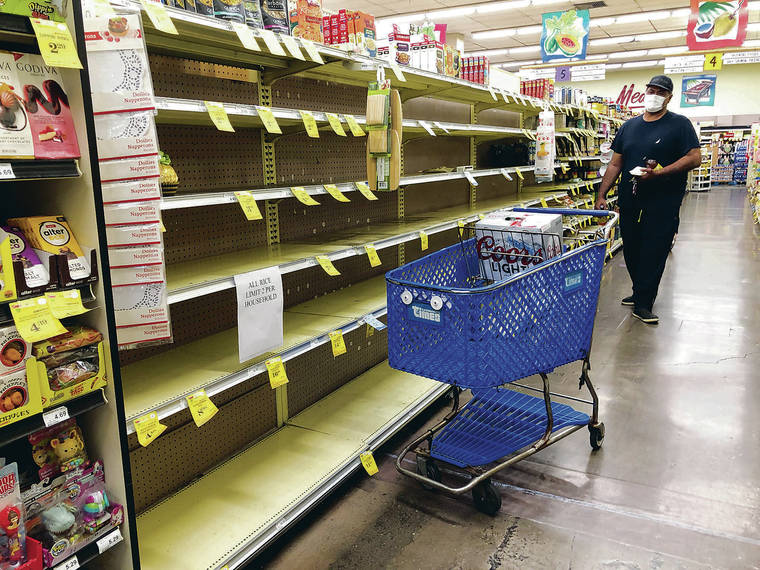Hawaii businesses continue changing with growing coronavirus outbreak

GEORGE F. LEE / GLEE@STARADVERTISER.COM
The parking lot at Ehukai Beach Park on the North Shore was empty Saturday.

MARK LADAO / MLADAO@STARADVERTISER.COM
A shopper looking for rice Saturday at the Times Supermarket on Beretania Street was surprised to find that the store was all out.


As the growing COVID-19 pandemic continues to upend daily living in Hawaii, stores still open for business have also been forced to continue adjusting in response to government orders, the spread of the virus and changing customer habits.
Gov. David Ige’s recent stay-at-home order — Hawaii’s most widespread government response to the new coronavirus, which had infected 175 people in Hawaii as of Sunday — has closed all but “essential” businesses like health care facilities and post offices.
Though supermarkets and restaurants are among the stores still allowed to operate, they have had to figure out ways to accommodate customers who are hunkered down at home, mostly staying away from other people and targeting items like toilet paper, cleaning products and rice when they are out shopping.
Initially, supermarkets and wholesale stores began limiting the number of such high-demand items customers can buy in one trip. Foodland, Times Supermarkets and Whole Foods are among those that also began dedicating hours for seniors and other groups who might be more vulnerable to the coronavirus.
Later, stores began including in-store reminders for customers to practice “social distancing.” Many supermarkets and grocery stores have signs at cash registers reminding customers to keep a recommended 6 feet from each other, and have placed tape on the floor as markers in an attempt to keep customers in line from standing too close to each other.
Nalani Hunt, general manager at Costco, said Costco is limiting the number of people allowed inside and keeping only every other register open to help maintain that distance.
Don't miss out on what's happening!
Stay in touch with breaking news, as it happens, conveniently in your email inbox. It's FREE!
“The newest changes have been making the social distancing happen,” Hunt said via telephone from the Hawaii Kai Costco.
Chris Borden, president of Times Supermarkets, said plastic “health shields” will be installed at cash registers at Times Supermarkets. He said employees get their temperatures taken twice a day at work, a practice that started about a week ago.
Borden acknowledged the increased exposure grocery store workers have to the coronavirus.
“I think one of the things people don’t really know is that with everyone on this lockdown, groceries can’t do the same thing. If there’s one thing I want to urge the community to do is be cognizant of that,” Borden said. “Employees are on the front line. Try to practice all the social distancing rules and regulations. … We don’t want our employees to get sick, either.”
Zippy’s closed its indoor seating areas, created barriers to ensure employees are at least 6 feet from customers and adjusted its menu, removing some items that might take longer to make.
“The idea behind offering a limited menu was to increase the speed of service … so we’re not creating any crowds in the stores,” said Kevin Yim, Zippy’s spokesman.
Yim said the coronavirus outbreak has also triggered a growing experiment to get customers to use Zippy’s phone or online application to order takeout. They pay on their phone, drive to the restaurant and park in a stall, where an employee will greet them, check the order number on their phone and deliver their food.
Customers never have to leave their car — another move to promote social distancing.
“Most of our locations are doing this service where they do come out to your car when you pull in,” Yim said, but added it is still a work in progress.
Starbucks locations across the country have begun offering a slew of benefits to ease the struggles faced by both employees and those on the front line of the COVID-19 pandemic.
The coffeehouse chain announced that it has decided to offer free coffee to first responders and health care workers, who fear the rapidly growing number of cases in the country could overwhelm the health care system.
Starbucks also decided to pay employees, including those in Hawaii, for a month even if they are not working, and is increasing pay for those who are. Starbucks’ benefits include providing employees, or partners, with food and drinks on their days off.
“We’re doing that knowing a lot of our partners have two jobs. Some of them have lost their jobs, so we’re trying to supplement them as much as possible,” said Kim Dowse, Starbucks’ senior director of operations, corporate and licensed locations.
Dowse, who oversees all the licensed and company-operated Starbucks locations in Hawaii, said all but eight stores in the state are closed, and the open locations are only offering drive-thru service.
Borden said similar employee benefits have been given to Times Supermarket employees, and Sheryl Toda, spokeswoman for Foodland, said benefits for Foodland employees are in the works.
While many of the changes are well-intentioned, they are sometimes flawed in execution, indicating their experimental nature during an unfamiliar situation.
When supermarkets first began dedicating their opening hours to seniors — to provide a more comfortable and safer shopping experience — complaints were voiced online that the stores were still too crowded.
“We didn’t anticipate that so many kupuna would show up before the store opened on the first day,” Toda said. “We have since seen a reduction of kupuna in the subsequent days, and we have asked the stores to please ensure that they are practicing social distancing.”
Philip Harvas, 70, who was shopping Friday afternoon at the Foodland Farms at Ala Moana Center, said he has never taken advantage of the senior hours. But he said they are still important to seniors, who could be wary of shopping with younger people who might be cavalier about getting and spreading the coronavirus.
“They have no fear of this virus — they feel invincible,” he said. “It’s the millennials. They’re the culprit.”
Businesses are trying to ride out the slowed economy, which has led to layoffs, reduced work hours and tens of thousands of workers in Hawaii filing for unemployment Opens in a new tab.
The historic $2 trillion rescue package signed into law Friday by President Donald Trump shows the gravity of the situation across the U.S., which recently surpassed China and Italy as the worldwide leader in COVID-19 cases.
Times Supermarket’s Borden said there is a possible misconception that supermarkets and grocery stores are doing well across the board. He said some of his stores that serve a lot of tourists are underperforming.
Yim was also worried about the social effect the coronavirus is taking on some people, noting that Zippy’s restaurants have become social gathering places for many of Hawaii’s seniors, who he said sometimes eat multiple meals per day at the restaurants.
“For many of them, especially if they’re single, the act of going shopping in a supermarket and cooking food is very difficult when you’re cooking for one,” Yim said, adding that regular customers would “also sit there with some of their friends and have some community contact, and now that’s been severely reduced. So I really pray for our kupuna, in particular.”



